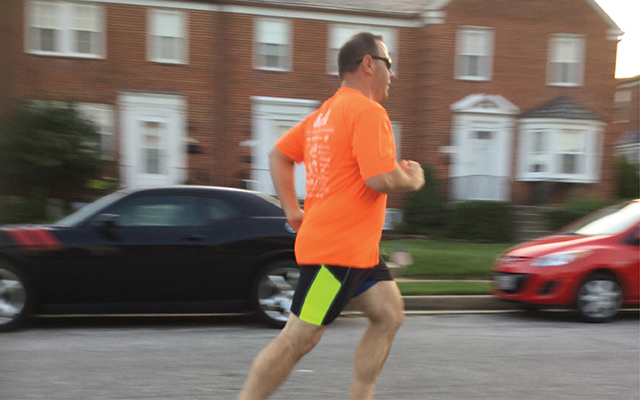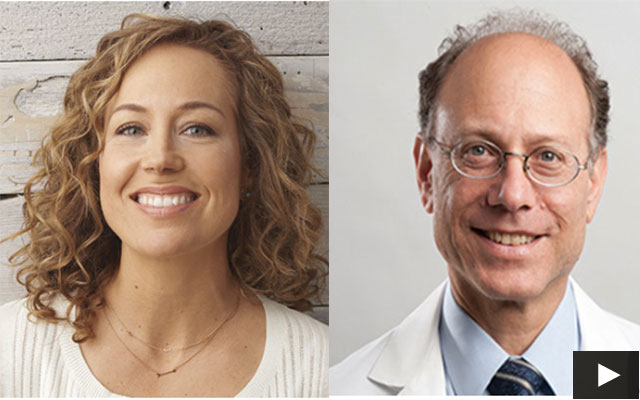When our first child was born in 2007, I had an awakening. Carrying 285 pounds on my 5-foot-11-inch frame, I was completely out of shape. I had become a self-indulgent person, and it was time to start living for my family.
This new sense of responsibility inspired me for a while, but after four years of yo-yo dieting and sporadic workouts, I realized the gravity of the challenge I faced. It wasn’t until my wife snapped a photo of me standing next to my daughter at a water park that I came face to face with who I’d become. I thought, Is that really me?
I knew it was time to get serious about improving my health. I started by simply taking a walk outside every day, and I dropped some pounds right away.
I graduated to running and signed up for some races — not for money or medals, but for motivation. That kept me going for a while, but then I abruptly stopped losing weight. By the fall of 2014, I was running out of hope.
I knew my eating habits weren’t ideal; late-night snacking, in particular, was my Achilles’ heel. But I didn’t realize that my diet was seriously impeding my attempts to lead a healthier life.
Destructive Patterns
I wasn’t an adventurous eater. I loved meat, pizza, Chinese takeout on Friday nights — pretty standard American fare. It didn’t help that my sales job meant I spent a lot of time in my car (and often ate there, too).
I had tried plenty of quick-fix diets, but they had been tough to maintain. Anytime I slipped up, out came “old Eric.” I would eat a healthy breakfast and lunch, but at night I would raid the fridge. No matter how much I ate, I never felt satisfied.
Some days I would run 10 miles, which I used as justification to eat more. I’d get home and step on the scale to learn that I’d gained a pound. It was incredibly frustrating. In my darkest hours, I started to think, Well, maybe this is just my body, forever.
Then I learned about “Always Hungry?” the weight-loss and healthy-lifestyle program (now a best-selling book) created by Harvard researcher David Ludwig, MD, PhD. I was more than ready for a change, so I went all in.
Healthier Habits
The “Always Hungry?” program started with a prep period. I removed all the taboo foods — mostly certain types of unhealthy fats and sugars — from the kitchen. My wife and daughter watched from the dining room as I trashed package after package. It was drastic, but it was the eye-opener I sorely needed.
I outfitted our kitchen with fresh produce, lean proteins, and healthy fat sources; I bought some new cookware and a host of new spices. I stocked up on all the things I needed to live a more wholesome lifestyle.
I learned that sleeping well is critical for healthy weight loss, so we decluttered our bedroom and installed softer, more calming lighting.
With a tight budget and busy schedule, I had to plan carefully to stick to the program. Over the weekend I prepped all my meals for the week ahead, which helped curb temptation. I also learned to feel comfortable bringing my own meal to a party. It’s my body: I choose how to treat it.
During Phase I, I discovered that food has the power to energize me or drag me down. Surprisingly, I didn’t miss the junk I used to eat. My palate began to evolve as I experimented with recipes from the program: I enjoyed chicken curry, marinara primavera, and other dishes I had never tried before. I started to cook and eat in a whole new way.
The first phase was easier and more gratifying than I expected, and I dropped weight rapidly. I sailed through Phase II, which added some starchy vegetables and whole grains to my diet, as well as some natural sweeteners, like honey and agave. I was no longer hungry all the time.
But when I added a little processed sugar back into my diet during Phase III, it all fell apart.
It took me months to realize that sugar is at the root of my eating issues: It obliterates my self-control. During that stretch, I returned to my old ways, eating whole bowls of ice cream and devouring nearly everything in the kitchen. I finally admitted I needed to cut sugar out of my life. This time for good.
Life-Changing Knowledge
In December 2015 I did a reboot of the “Always Hungry?” program, hoping to get back to where I’d been — physically and mentally — before I’d reintroduced sugar. The program had helped me take a good look at what I eat, when I eat, and how much I eat. Without sugar in my diet, I lost weight and felt good. When I didn’t have it, I didn’t miss it.
Around that time I came across an article about the symptoms of binge-eating disorder, most of which, sadly, were familiar. I thought, This is me! This is what I do!
While my weight-loss results made me a firm believer in Ludwig’s approach, this new knowledge changed my life. I met with my general practitioner, who confirmed I had the eating disorder and prescribed medication to help me manage it. It was such a relief to know this — for years I’d wondered why I struggled to stop eating. I finally understood my food issues were not just about willpower: It’s a medical condition and there is a name for it.
In the past 10 months, I have completely changed my lifestyle by sticking with the “Always Hungry?” program; the eating-disorder medication is helping me stay on track. I’m down to 227 pounds and I feel better than I’ve felt in years. At my latest follow-up visit with my doctor, he told me I’m at the lightest weight I’ve been since I started seeing him a decade ago.
I still have some work to do to reach my goal weight of 200 pounds. But I’m playing hockey, I’m more active in my church, and I’m keeping up with my 3-year-old son, who is a ball of energy. My 9-year-old daughter and I revel in our after-dinner walks, and at the dinner table she is trying out vegetables she historically refused to eat. All my lifestyle changes have led to a life full of small moments that I would have otherwise missed.
I keep the unflattering photo of my daughter and me in the kitchen to remind myself how far I’ve come and to keep myself honest. We take a new photo every year on vacation, and the original comes with me. I know this year’s will be the best yet.
Success Summary
Meet: Eric Dietzius, 46, a salesman who lives in Maryland with his wife, daughter, and son.
Big Achievements: The first is sartorial: “I wore a white polo shirt for the first time in more than a decade,” Dietzius says. The other? “Kicking added sugars and processed carbs out of my life.”
Big Inspiration: Eric was inspired by the birth of his daughter to improve his health, but after yo-yo dieting for years, he was reinspired by an unflattering photo of himself with his daughter at a water park. It hangs in his kitchen to remind him of how far he’s come.
What Worked: Changing his diet for the healthier by eating lots of fresh produce and healthy fats, and by cutting out sugar.
What Didn’t Work: Focusing on his fitness routine without changing his diet, and using his workouts as an excuse to eat more. With the guidance of the “Always Hungry?” program, Eric realized that processed sugar and carbs were sabotaging his healthy-eating efforts.
Words of Wisdom: “This is a lifestyle change, not just a change in the kitchen,” he says. “Food affects you both positively and negatively, but this isn’t just about food. It’s about sleep, relaxation, and exercise, too. They all affect each other — they all go hand in hand.”



This Post Has 0 Comments